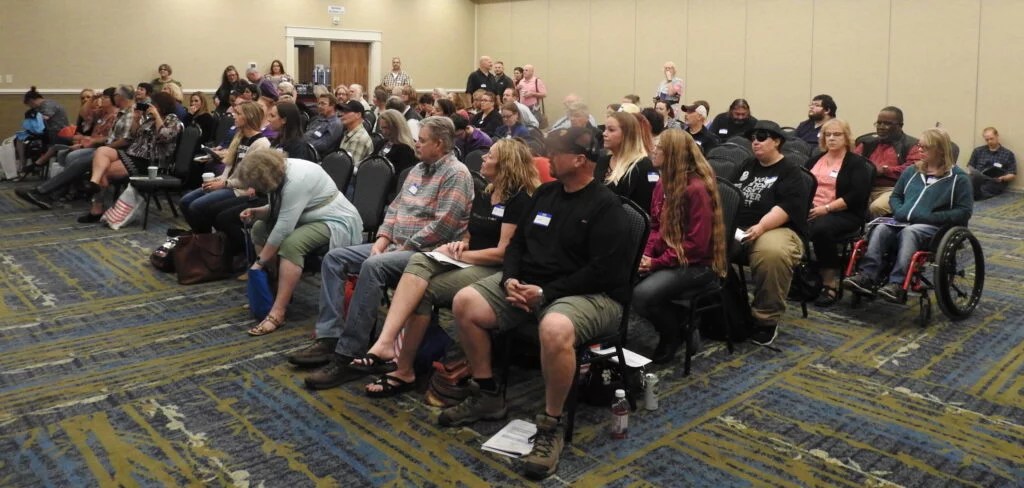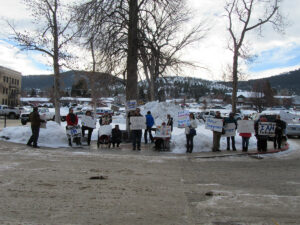We are a network of individuals who are on the path of recovery.
We identify as being in recovery from mental health, substance abuse and or addiction struggles. Together we share information, provide peer support, advocate with a united voice and improve the system. We come from places all across Montana, with different stories and experiences but together we make a difference. This is the Recovery Movement in Montana.


Realizing Recovery Blog
Putting Principles into Practice
In the beginning of my recovery journey my life was about bringing myself to a balanced state of mind so that I could begin to build a life of purpose. Early recovery was about discovering who I was through a healing process that brought me inwards towards many wounds that I felt would be my demise. Through this emotional roller coaster ride, I learned that after the scariest moments of remembering past hurt came equally enlightening moments of truth that helped me face my past and build a life beyond recovery.
Beyond Recovery
Living a life to develop the best results in growth and healing, I have learned to be open and mindful of multiple pathways recovery entails. Beyond the inpatient, outpatient, justice programming, and whatever else was “expected” of me, I have dipped into reconnecting to my traditional, American Indian ways.
Beyond Recovery
Early on in my recovery, I was very focused on myself, and that was necessary. I spent countless hours in treatment, in therapy, and in 12 step meetings.
Leap of Faith
Relationships have served as a mirror into my heart, showing me where I need to grow and giving me the inspiration to overcome my greatest fears. Relationships reflect my internal frame of reference, the dominant conditioning that insists on being safe. I unknowingly used relationships to justify an abandonment wound I held since childhood.
Healthy Relationships
Well, this will be my fourth time I have written on this topic while at MPN. Lets see what my heart puts down on paper. I believe that relationships are what gives each of our lives purpose.
Forms of Advocacy
There are many different forms of advocacy, let me take you on my journey with advocacy. My recovery began in 2007 however I was being advocated for as early as 2003.
What is Advocacy
Advocacy is and activity by an individual or group aiming to influence rules, laws, and processes to bring a change wanted by the individual or group. the new Montana Legislative session begins today in Helena with our voted Representatives. This session will work with new laws passed and amendments made to existing laws also changes to funding for services provided for people in Montana. Montanas Peer Network offers opportunity to learn how to professionally ask and advocate for changes you feel are needed to empower recovery oriented behavioral health services in our state.
My Journey of Spirituality
Spirituality is something I really struggled with in early recovery. It took me a long time to realize that spirituality was something that I defined for myself, it was a personal journey. I have a lot of religious trauma in my story and though I tried in early recovery to adopt other peoples traditional religious views as my spirituality, that created an internal conflict that I could not deny.
Gritty Spirituality
Spirituality is gritty. I spent many years trying to find God, sitting in meditation for hours a day attempting to make her something separate of myself that would give me a golden ticket into heaven. Attempting to be good enough to achieve unlimited access to worth, making up for lost time in meditation and prayer, life could be good if I said the right words and did the right actions.
Peer Support Specialist Committee
The Peer Support Specialist Committee was formed in 2020. It was established so that the peer support workforce had a group of people representing the workforce, willing to take on challenges and work towards finding and implementing solutions for issues.
Advocacy
Check out our new page dedicated to tracking state and federal bills, executive orders, and lawsuits.
 Standing up for what we believe is right, having a voice, making choices in recovery, and sharing our own recovery story are some of the things that make up advocacy and self-advocacy.
Standing up for what we believe is right, having a voice, making choices in recovery, and sharing our own recovery story are some of the things that make up advocacy and self-advocacy.
Let’s start with self-advocacy which refers to an individual’s ability to effectively communicate, convey, negotiate, or assert his/her own interests, desires, needs, or rights. It involves making informed decisions and taking responsibility for those decisions (Van Reusen et al., 1994).
Knowing yourself and your strengths, needs, and interests is the first step toward advocating for your rights. Once we begin to find our way on the path of recovery, we may want to begin to advocate for ourselves with those around us—peer supporters, friends, family, service providers, and doctors. These conversations may be difficult, but having them is vital to your recovery. Remember, you are the expert on yourself.
It may be that prior to getting on the path to recovery, others were making decisions for you or acting in what they believed to be your best interest. Now may be the time for you to let others know what you believe to be in your best interest. You may find yourself in the process of taking control and making decisions affecting your life and perhaps others’ lives. This process of self-determination means making informed choices, problem solving, setting and attaining goals—essentially being a self-advocate.
Advocacy or advocating for others may be something you are interested in doing. Advocating for another person isn’t about acting in a person’s perceived best interest, but it is standing with a person to ensure they are able to articulate and obtain what they want or need. Perhaps you may consider speaking up and advocating for various changes in the services in your community.
Here are a few examples of advocacy:
- Speak to your legislature or a special committee.
- Get involved with an advocacy group or organization.
- Share your recovery story to support others in recovery.
- Whether advocating for yourself, for others, for your community, or as part of an organization, advocacy is very self-empowering. You can make a real difference in your life, the lives of others, and even the community.
- Reach out to Montana’s Peer Network and share your recovery story on one of our “Recovery Talks” podcasts.
Advancing Advocacy Blog
Societal Issues Affecting Mental Health
It is hard to not see suffering on a daily basis around the world, in the United States and here in Montana. When I tune in for my daily dose of news, I am often struck by the lack of awareness around mental health related issues. For example, in Texas where the extreme flooding occurred there is virtually no reporting on mental health counseling, or peer support for the massive amount of grief and loss that is taking place. In the nearly weekly reporting of mass shootings at places of work, schools and in our communities across the nation, we fail to address mental health needs.
Snapshot - Challenges in the CBHPSS Workforce
The certified behavioral health peer support specialist workforce has faced many challenges since its inception 8 years ago. We fought to establish ourselves in the behavioral health system, we have had to educate and inform the public, and we have had to grow the workforce. MPN has been training peer supporters since 2015 long before certification went into effect in 2018. The basis for the training then and now is the National Practice Standards from SAMHSA. We have trained more than one thousand peer supporters during the last ten years which has provided us with a unique perspective on the workforce. We are not new to the game as are some of the other trainers. Nor are we from out of state here to get wealthy, then disappear after we get a check. We want to see a strong behavioral health peer support workforce now and into the future. In order to do that there needs to be a platform for identifying and addressing the issues. Montana lacks that platform. One that is free from outside influence. At MPN, we have tried many times over the years to participate in such an effort only for it to get corrupted, forcing us to step away. In this article I have broken down the most notable challenges in the behavioral health peer support workforce and some possible solutions.



